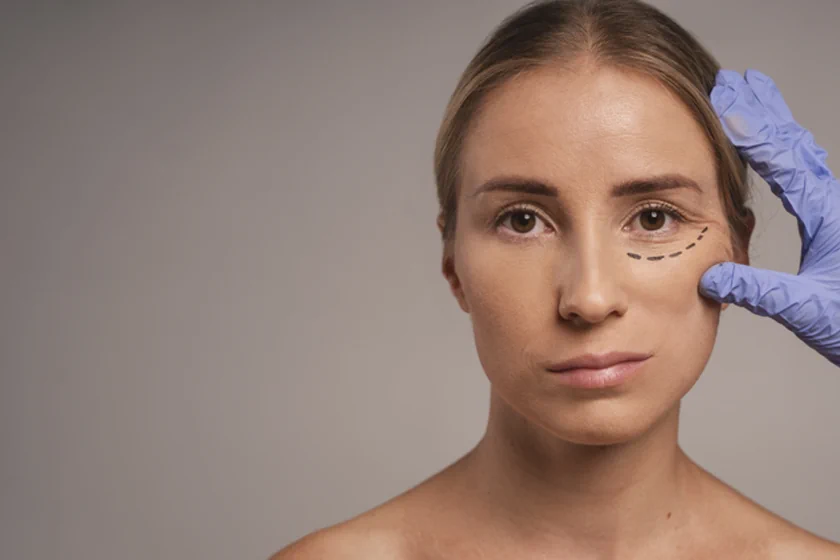|
Getting your Trinity Audio player ready...
|
What is Thyroid Eye Disease (TED)?
Thyroid Eye Disease, also known as TED, is a condition often associated with thyroid disorders, including Graves’ disease. It primarily affects the muscles and tissues around the eyes. Dr. Surbhi Kapadia, an esteemed ophthalmologist in Vadodara, explains that while TED is related to thyroid health, it manifests distinctly in the eyes.
In the intricate world of eye health, certain conditions intertwine with broader systemic health issues, presenting unique challenges for both patients and doctors. One such condition is Thyroid Eye Disease (TED), a complex and often misunderstood eye disorder closely linked with thyroid health. Dr. Surbhi Kapadia, a renowned ophthalmologist and a leading authority on eye diseases in Vadodara, offers her valuable insights into this condition. Through this blog, we aim to demystify TED, exploring its causes, symptoms, and the latest treatment options, and how it impacts the lives of those affected. Join us as we delve into the world of Thyroid Eye Disease, guided by the expert knowledge of one of Vadodara’s best ophthalmologists.
Understanding the Causes of Thyroid Eye Disease
The Interplay Between Thyroid Function and Eye Health:
Thyroid Eye Disease (TED) is most commonly associated with Graves’ disease, an autoimmune disorder that leads to overactivity of the thyroid gland (hyperthyroidism). However, it can occasionally occur in patients with hypothyroidism (underactive thyroid) or even those with normal thyroid function. Dr. Surbhi Kapadia, an esteemed ophthalmologist in Vadodara, explains that the underlying mechanisms of TED are complex and involve several factors:
Autoimmune Response:
Immune System Malfunction: In TED, the body’s immune system mistakenly attacks the tissues around the eyes. This autoimmune reaction is believed to be triggered by antibodies that target the thyroid gland but also cross-react with tissues in the eye orbit.
Shared Antigens: Certain proteins in the thyroid gland share similarities with proteins in the eye tissues. This similarity can cause the immune system to target both, leading to inflammation and swelling in the eye area.
Genetic Factors:
Genetic Susceptibility: There is a genetic predisposition to autoimmune thyroid disorders, which in turn can increase the risk of developing TED. Dr. Kapadia highlights that individuals with a family history of thyroid disorders or autoimmune diseases are more likely to develop TED.
Environmental Triggers:
Smoking: Smoking is a significant risk factor for TED. Smokers with Graves’ disease are more likely to develop TED, and their symptoms are often more severe.
Radiation and Other Factors: Exposure to certain types of radiation and environmental toxins may contribute to the development of both thyroid disorders and TED.
Hormonal Influences:
Thyroid Hormone Fluctuations: Fluctuations in thyroid hormone levels can exacerbate the symptoms of TED. Both hyperthyroidism and hypothyroidism can have implications for eye health.
Stress and Infection:
Stress as a Trigger: Stress, both physical and emotional, can trigger or worsen autoimmune reactions, including those seen in TED.
Role of Infections: Some researchers suggest that viral or bacterial infections could act as a trigger for the onset of Graves’ disease and subsequently TED.
The Complexity of TED:
Dr. Kapadia emphasizes that the causes of Thyroid Eye Disease are multifaceted, involving a combination of immune, genetic, environmental, and hormonal factors. This complexity can make TED a challenging condition to manage, necessitating a holistic approach to treatment and care. Understanding these underlying causes is critical in developing effective treatment plans and providing comprehensive care to patients suffering from TED.
What are the Symptoms of Thyroid Eye Disease?
The symptoms of TED can vary in severity, but commonly include:
- Bulging eyes (proptosis)
- Redness and swelling
- Dry, gritty sensation in the eyes
- Sensitivity to light
- Blurred or double vision
- In severe cases, vision loss
Dr. Kapadia emphasizes the importance of early detection and treatment to prevent complications.
Treatments for Thyroid Eye Disease
Treatment for TED depends on the severity and the specific symptoms presented. Dr. Kapadia outlines the following approaches:
Mild Cases: Management might include artificial tears for dry eyes and protective eyewear.
Moderate to Severe Cases: Options include corticosteroids to reduce swelling, immunosuppressants, or radiation therapy.
Surgical Interventions: In cases where vision is threatened, or for cosmetic reasons, surgery may be considered. This can include orbital decompression surgery, eye muscle surgery, or eyelid surgery.
Cost Considerations: The cost of treatment varies depending on the severity of the condition and the type of treatment required. Dr. Kapadia’s clinic in Vadodara offers transparent cost information and assistance to ensure patients are well-informed.
Can You Live with Thyroid Eye Disease? Unveiling the Truth by Dr. Surbhi Kapadia
Living with TED requires ongoing management. Dr. Kapadia reassures patients that with appropriate treatment, most individuals with TED can maintain a good quality of life. Regular monitoring and adjustments in treatment plans are key to managing this condition effectively.
Frequently Asked Questions (FAQs) About Thyroid Eye Disease
Introduction to FAQs:
Thyroid Eye Disease (TED) often brings a myriad of questions and concerns. Dr. Surbhi Kapadia, a leading expert in eye care in Vadodara, addresses some of the most frequently asked questions to help demystify this condition and offer clarity to those affected.
What is TED Thyroid Eye Disease?
TED is an autoimmune condition associated with thyroid disorders, particularly Graves' disease, characterized by inflammation and swelling of the eye and surrounding tissues.
Can TED be Cured?
While there is no outright cure for TED, its symptoms can be effectively managed and treated, especially with early intervention.
What is the Classification of TED?
TED is classified based on severity and activity. The classifications range from mild, moderate to severe, and sight-threatening, and they guide the treatment approach.
How Common is TED?
TED is most common in individuals with Graves' disease, but it's relatively rare in the general population.
What are 3 Signs of Thyroid Eye Disease?
Common signs include bulging eyes (proptosis), double vision (diplopia), and red, swollen eyelids.
What is TED Treatment?
Treatment options vary from conservative measures like eye drops for mild symptoms to surgical interventions for more severe cases.
How is TED Diagnosed?
TED is diagnosed through clinical evaluation of symptoms, imaging tests like CT or MRI, and blood tests to assess thyroid function.
Can Thyroid Eye Disease Cure Itself?
TED can go into remission on its own, especially in mild cases, but active intervention is often required to manage symptoms and prevent complications. Supportive care & intervention at the right time can help preserve vision in patients with TED, highlighting the need for regular eye exams with an oculoplastic surgeon.
What Causes TED Eye Disease?
TED is caused by an autoimmune response linked to thyroid disease, where the immune system mistakenly attacks the eye muscles and tissues.
How Do You Treat TED Eye Disease Naturally?
Natural treatments include maintaining a balanced diet, using selenium supplements (as advised by a doctor), and avoiding smoking.
How Do You Check for Thyroid Eye Disease?
A clinical examination by an ophthalmologist is the first step. They may recommend specific imaging or blood tests for a conclusive diagnosis.
What is the Best Eye Drops for Thyroid Eye Disease?
Lubricating eye drops are often recommended for managing dryness and discomfort in TED. The best choice may vary depending on individual symptoms and should be discussed with the best doctor for Thyroid Eye Disease.
Final Notes
Thyroid Eye Disease can be a challenging condition, but with advances in treatment and the expertise of specialists like Dr. Surbhi Kapadia, it can be managed effectively. Being the best doctor for the thyroid eye in Vadodara, Dr. Kapadia is committed to providing compassionate and comprehensive care to her patients.
For more information or to schedule a consultation, patients can contact Dr Surbhi Kapadia at her practice in Vadodara.
![]()







